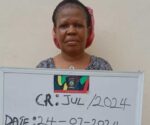British Judge Confused over Ibori’s Case
LAGOS APRIL 17TH (URHOBOTODAY)-A British court will today attempt to break the logjam that bogged it down all through last week to try former Delta State Governor James Ibori afresh or not as the ex-governor’s confiscation case resumes.
The proceedings was bogged down after that Judge Anthony Pitts repeatedly said in the course of the submission of James Ibori’s defence team at Southwark Crown Court London that he was confused. He said that he was becom- ing even much more confused ‘now’ as the case being argued by Ibori’s lead counsel, Mr Ivan Krolic continued to unfold.
Judge Pitts while express- ing his frustration addressed Ibori’s lead counsel: “there was confusion though not in your mind, but there is a deep confusion in my own mind”. Responding to the Judge’s confessing, Mr Krolic said, “If the court is confused, has the court listened to the arguments at all? We have proved our position to the court from the outset. Mr Ibori has made his case clear. We also have made our case clear as the counsels. If you had allowed me to finish my submission, you would not have been confused”.
Quoting extensively from the transcript of the proceed- ings from the time the case started, and certain decisions made by the Judge, Mr Krolic said: “both sides have con- ducted this confiscation trial, both sides have closed their case, the defence has cross- examined witnesses. To now suddenly say to one party, I want you to investigate and change your case so that you could win, in my opinion, no court would give such an or- der”. He continued: “the court is the sole decider of the law and the court has to be impar- tial, each side has experienced counsels and solicitors, there is no need for the court to be involved”. Making it clear to the judge that he had in the course of the proceeding last year, blocked the attempt by the crown prosecution to insert Assumption 72AA to all the
items (thus tasking Ibori with proving his innocence instead of the prosecution proving him guilty), Krolic said, “your honour while applying your discretion on the application for assumption 72AA to be introduced into all the items said it would amount not only changing the goal post but moving the goal post from the field of play”.
Reacting to Krolic, Judge Pitts asked: “are you saying if in the course of a case and as the case unfolds, I noticed that I have made some decisions, are you saying I cannot revisit
it?”“Your honour has no power to do so,” Krolic replied. Not satisfied, the judge asked Kro- lic again ‘are you saying a judge can’t revisit a discretion applied having realised some confusion as the case devel- ops.” Krolic replied again, saying, “…the court can’t say I am confused, telling one par- ty, I am going to let you start again. Once the court makes a decision, you can’t undo it, you can’t retrace the past. And if the court is confused, that is what the advocates are there for”.
Insisting on his legal argu- ments that the Judge can’t sud- denly grant the prosecution’s request to let the case start afresh, Krolic said, “you have rejected their application in October, your honour was not confused because you gave clear reasons”.
The judge in his reply said: “but the case could be re- opened.” Krolic said that if the case is reopened, it will be a different case entirely and the judge asked ‘why is it a differ- ent case”. Krolic replied “the real problem is that the de- fence would now have to sat- isfy the burden of proof taking it away from the prosecution”.





















